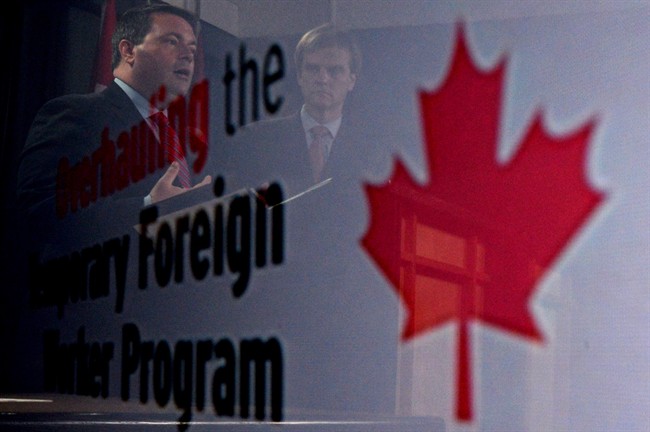OTTAWA – The Canadian Federation of Independent Business is calling on Ottawa to replace its controversial temporary foreign worker program with a visa that would provide a path to permanent residence for entry-level employees from abroad.

The organization says in a report released today it’s proposing the Introduction to Canada Visa that would address labour shortages for small businesses. (Read the full report below).
CFIB president and CEO Dan Kelly says the temporary foreign worker program has been legitimately criticized for using TFWs to fill permanent labour market needs.
READ MORE: Temporary foreign workers program reforms: winners and losers
He adds that small businesses would much rather hire permanent workers, but the immigration system doesn’t allow them to hire people with entry-level skills. The Canadian economy needs workers at all skill levels, Kelly says.
READ MORE: Memorial service held for 4 Filipino workers killed in collision near Edmonton
The CFIB’s proposed new visa would give foreign workers in entry-level categories an opportunity to work with an employer for two years as a defined step towards permanent residency.
Kelly also says that under the proposals any company seeking to hire an entry-level worker from abroad would have to employ a Canadian employee at the same wage.
In response to the report, a spokesperson for Canada’s minister of employment issued the following statement:
“The Temporary Foreign Worker Program should be available to employers only as a last and limited resort to fill real skills shortages on a temporary basis, and only when qualified Canadians are not available. The federal Government introduced significant reforms in June 2014 to end the growing practice of employers building their business model on access to the Program,” said Alexandra Fortier.
“Before having access to temporary foreign workers, employers will now have to disclose how many Canadians applied for a position and explain why they were not hired. The federal Government also introduced a cap to limit the proportion of low-wage temporary foreign workers that a business can employ. The cap will significantly restrict access to the Program, while ensuring that Canadians are always considered first for available jobs, reducing employer reliance on the program and increasing wages offered to Canadians. Employers who want to hire temporary foreign workers in high-wage occupations will be required to submit transition plans with their Labour Market Impact Assessment (LMIA) application to ensure that they are taking steps to reduce their reliance on temporary foreign workers over time,” she added.
“We believe that employers must do more to hire under-represented Canadians like youth, Aboriginal people, and Canadians with disabilities, rather than bring in temporary foreign workers to fill jobs.”
With files from Global News

Comments